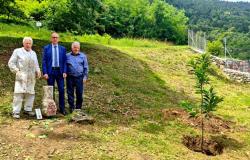Something can be recovered, but only if climatic conditions are finally able to stabilize. In the meantime, however, much has been lost and there is nothing left to do about that much. Never before has honey production been so scarce this year: fault of heavy and constant rain which ruined the blooms.
«Lime and acacia are now compromised»explains Mattia Cappello, urban beekeeper and president of the non-profit organization Apincittà. «These days it would be time for the second honey extraction: instead, not even the first one has been done. We are unable to make predictions on what this year’s production could be: at the moment we can hypothesize a contraction of 50%. LThe hope is to be able to recover something of the wildflower, thanks to wildflowers».
Monza: honey and difficult years between drought, rain and temperature changes
«The heavy rain showers during the spring blooms they literally washed away the nectar from flowers: the little that the bees managed to collect, they kept for themselves”he adds Luca Pisonia young beekeeper (for now) in his free time, but already involved in various educational activities Believe of the Monza park. «The last positive year was in 2020. Then, between drought and temperature changes, things no longer went right. Let’s hope we can save something of the lime tree, which has been blooming well in the park in recent days, and that the bees will then also be able to take advantage of the ailanthus and the blackberry. The acacia and the first wildflowers have disappeared: here in our country, but also in many other regions of Italy, albeit for different reasons. In the south, in fact, the lack of nectar is due to the severe drought.”
The balancesubtle, between the climate, the plants and the bees «is now more fragile than ever, and it is important to take care of every link in the chain: this is what I always try to explain to the classes that come to visit Creda. Another worrying aspect, reports Cappello, is the “reduction in the number of bees in the hives: it was a cold spring, as well as wet, and the queens laid fewer eggs”.
Monza: the temperatures that kept the bees “awake”.
The cold spring was instead preceded by an exceptionally mild winter and this also influenced the behavior of the bees: it explains Pisoni That «the bees, which usually enter a state of quiescence in winter, pushed by the cold temperatures instead left the hives, without however finding food to feed themselves: they got tired and lost precious energy». «In the hives of some of our families we only placed the supers last week: before, it wouldn’t have made sense»: further testimony to the difficult conditions comes from Marinella Aprilone of the two volunteers who dedicates herself to caring for the families who have found a home in the spaces of the biodiversity oasis of Enpa Monza and Brianza.
«Our objective – he explains – is not that of honey production: we are primarily concerned with the well-being of the four families who now stay with us and with organizing educational activities. The little nectar they manage to collect when they leave the hive is currently sufficient for their survival. Compared to previous years, during this spring we also observed another change: in the past, starting from the month of April, we noticed the presence of wild wasp and hornet nests: this year there are none».





